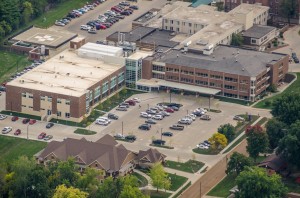Mahaska Health Partnership Educates on Hernias
MAHASKA COUNTY – A hernia is a common health condition often requiring surgery. MHP General Surgeon Paul Riggs, MD, FACS, explains the causes and what to look for.
According to Dr. Riggs, a hernia occurs when an organ or fatty tissue squeezes through a weak spot in a muscle or connective tissue. “There are different types of hernias that can occur throughout the body. No matter where they occur, hernias are caused by a combination of pressure and weakness in muscle or its lining. If the hernia opening is large enough, an organ or tissue can be pushed through the weak spot.”
While anything that increases pressure in the abdominal area can cause a hernia, there are some conditions that can increase your likelihood of having one. “Lifting heavy objects, straining from constipation or severe coughing and sneezing can lead to hernias,” Dr. Riggs explained. “Poor nutrition, obesity and smoking can all lead to weakened abdominal muscles, also increasing your risk of a hernia.”
Depending on the type of hernia, there are multiple symptoms to watch for. “Look for swelling beneath the abdomen or groin for signs of a hernia,” Dr. Riggs cautioned. “Constipation or blood in the stool can be another sign, as well as discomfort in the abdomen or groin when lifting or bending over and tenderness to the touch. Hiatal hernias may cause upper abdominal pain or heartburn.”
Medical care will be necessary to repair the damage a hernia causes. “If you push on the hernia and cannot get it to go back in place, you should seek immediate medical care, as there may be strangulation of an organ,” Dr. Riggs advised. “If you are also experiencing pain, nausea, vomiting or difficulty with bowel movements, you may have an intestinal blockage. Depending on the severity of a hernia, surgery may be necessary.”
While not all muscle weakness can be prevented, there are steps you can take to minimize your risk of a hernia. “Not smoking, maintaining a healthy body weight and properly lifting with your knees instead of your back can help prevent hernias,” Dr. Riggs shared. “If you develop a persistent cough, see your primary care provider for treatment and avoid straining during bowel movements or urination.”
Recognizing the early signs of a hernia is important to avoid long-term complications. “A hernia will not just go away on its own,” Dr. Riggs said. “However, with early detection, intervention and lifestyle changes, you can minimize the effects of a hernia and lower your chances of life-threatening complications like organ strangulation.”
General Surgeon Paul Riggs, MD, FACS, is an experienced, Board Certified Surgeon specializing in traditional, laparoscopic and robotic-assisted surgical treatments. Dr. Riggs commonly performs colonoscopies as well as operations on the gallbladder, colon and appendix. Dr. Riggs feels fortunate to serve in southeast Iowa; providing his surgical skills to patients needing treatment throughout the body’s torso, from the esophagus to the spleen. To schedule an appointment with Dr. Riggs, call 641.672.2455.
Mahaska Health Partnership, located in Oskaloosa, is a non-profit health system accredited by the Joint Commission. It is guided by its mission to provide exceptional customer service and health improvement, linking the science of medicine with the humanity of compassionate care. For more information about how Mahaska Health Partnership is making healthcare personal, visit mahaskahealth.org.
















